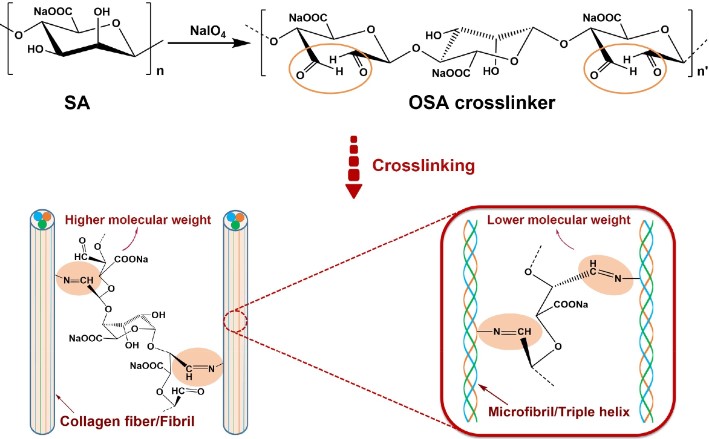Alginate Molecular Size Analysis Service
Services Published Data FAQs Customer Review
High-quality Molecular Size Analysis of Alginate at Creative Biolabs
Alginate is a natural product derived primarily from brown algae, such as seaweed. It is a polysaccharide with sticky and gelling properties. Alginate is often used as a thickener, emulsifier, and gel in the food industry, and it is used to prepare drug coatings, and oral preparations in the pharmaceutical field. Molecular weight is one of the important factors affecting the performance and quality of alginate. Creative Biolabs has a mature Seaweed Profiling platform. We provide a series of professional analysis services, including Sugars, Amino Acids, Elements, Pigments, Vitamins, alginate molecular size analysis, and other services.
Alginate with different molecular weights performs differently in terms of water absorption and gel-forming ability. Therefore, analyzing the molecular size of alginate better controls product quality and optimizes product performance. Methods for molecular weight analysis of alginate mainly include gel permeation chromatography (GPC), viscometry, nuclear magnetic resonance (NMR), etc. Through these analysis methods, information such as alginate molecular weight distribution and average molecular weight are obtained, providing necessary data support for its rational application. Among them, GPC is a commonly used molecular size determination method, and its determination includes the following steps:
-
Step 1: Preparation of samples and standard curve
We dissolve the alginate sample in an appropriate solvent. Then prepare a series of alginate with different molecular weights as reference materials, and establish a calibration curve for subsequent analysis of the alginate molecular weight in the sample.
-
Step 2: Balance the system
We select the appropriate column type and solvent system according to experimental needs. Generally, water or buffered salt solution is used. Then adjust the GPC instrument parameters, including column temperature, flow rate, detector settings, etc., and perform system calibration and balance.
We inject the dissolved alginate sample into the GPC system and start the analysis program to determine the molecular weight.
We used chromatography software to record the occurrence of individual molecular size peaks, including relative retention times and signal intensities. Then, the average molecular size, molecular size distribution range, and other information of the alginate sample to be tested are calculated according to the calibration curve.

The above are the basic steps for molecular size analysis of alginate. During specific operations, we will make adjustments and optimizations according to experimental conditions and instrument characteristics. In addition, as an expert in the field of analysis, Creative Biolabs will also provide custom analysis solutions for any of your samples. Please contact us to obtain your personalized analysis services. We will provide you with a high-quality service that exceeds your expectations.
Published data
Sodium alginate (SA) is a natural polysaccharide composed of two monosaccharides, α-L-guluronic acid (G) and β-D-mannuronic acid (M), alternately connected by β-1,4 glycosidic bonds. SA has excellent gelling properties, stability, and thickening ability, so it is widely applied in medicine, food, and industry. The gelling ability and physical properties of SA gel are not only related to the molecular weight distribution but also affected by the proportion, composition, and preparation method of uronic acid. This study aimed to prepare SA with different molecular weights and G/M ratios by acid modification method and determined its molecular weight by gel permeation chromatography (GPC). Moreover, the rheological properties and emulsification properties of SA were analyzed by temperature-controlled rheometer and multiple light scattering instruments. The results showed that after acid treatment, the molecular weight and apparent viscosity of SA decreased, and as the molecular weight decreased, the interfacial tension of the emulsion increased, which showed that the molecular weight had a significant effect on the emulsification ability of SA.
 Fig.1 GPC analysis results of SA.1
Fig.1 GPC analysis results of SA.1
FAQ
Q1: What sample should I provide for molecular size analysis?
A1: Alginate samples with higher purity are usually required. We will provide detailed sample preparation guidance according to sample properties and analysis requirements.
Q2: How is the accuracy of your molecular size analysis service guaranteed?
A2: We use advanced instruments and experienced technical teams for analysis to ensure the accuracy and reliability of the results, and follow strict quality control procedures.
Q3: What is included in the molecular size analysis results report?
A3: The report will include detailed information such as experimental methods, result data, molecular size distribution charts, etc., and provide you with suggestions for the results.
Customer Review
High-quality Service
"I am very satisfied with the alginate molecular size analysis service provided by Creative Biolabs. The results are accurate and reliable, and the service quality is first-class. Their professional analysis provides strong support for our project. I hope we continue to cooperate in the future."
Detailed Report
"The analysis results report provided by Creative Biolabs is detailed and the charts are clear and easy to understand, allowing us to quickly understand the molecular characteristics of alginate samples. They are a trustworthy partner."
Reference
-
Jiao, Wenxiao, et al. "Effects of molecular weight and guluronic acid/mannuronic acid ratio on the rheological behavior and stabilizing property of sodium alginate." Molecules 24.23 (2019): 4374. Distributed under Open Access license CC BY 4.0, without modification.
For Research Use Only.
Related Services


 Fig.1 GPC analysis results of SA.1
Fig.1 GPC analysis results of SA.1

